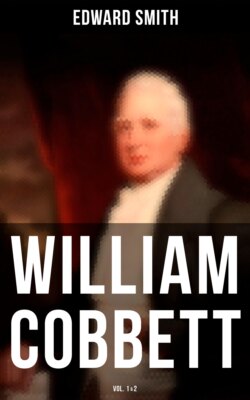Читать книгу William Cobbett (Vol.1&2) - Edward E. Smith - Страница 8
FOOTNOTES
Оглавление[1] This was Mr. Benjamin Garlike, who afterwards became envoy to two or three foreign courts. He died in 1815, unmarried, ætat. forty-nine. For a notice of him, vide Gent. Mag. lxxxv. 564. Cobbett met him again, when in the full tide of fame, and says that “he had lived so long in courts, had so long had to do with superior power, and had so long lived in submission to the mandates of others, that he became nervous when he heard my ordinary talk, about men in place and authority.”
[2] Some clever lecturer has said that “he had but little knowledge of books, and even less of other men’s thoughts.” We find, however, in “Porcupine’s Works” (1794–1800), quotations from, or references to, Swift, Shaftesbury, Pope, Sterne, Butler, Dryden, Shakespeare, Somerville, Racine, Montesquieu, Le Sage, Cervantes, Congreve, and Bishop Watson, besides minor names. But such is the way of these clever historical lecturers—cooking a man’s reputation in their own pot, and taking the skimmings for truth.
[3] Colonel Debbieg was himself no ordinary man, and had seen active service in various parts of the world. He entered the army in 1746, at the age of fourteen, served in the Low Countries, and afterwards in North America under General Wolfe, whose friendship and entire confidence he soon acquired. He was gazetted Colonel-Commandant of the Engineers early in 1783, but retired in a year or two; gazetted Major-General, 1798, General 1803. He died in 1810, at an advanced age, having employed his retirement in ingenious studies in fortification. The circumstance in the text refers to certain letters of Debbieg (who was a high-spirited fellow) which were addressed to his superior officer, the Duke of Richmond, then Master-General of the Ordnance. The Duke took offence, and demanded a court-martial on Debbieg, “for using indecent and disrespectful expressions towards him, and injurious and groundless expressions imputing partiality and oppression in the discharge of his duty.” The Colonel was found guilty, and reprimanded in open court, and ordered to apologize to the Duke, which he did, and his arrest was then terminated. It is pretty clear that this affair, however, did him no injury; and it is not unlikely that there was some ground for the “expressions” which he had used. No doubt the members of the court felt bound to protect the Duke in his official character, even if they thought that Colonel Debbieg had right on his side; and Cobbett must have very early learnt that military discipline did not always go along with even-handed justice. The sequel will show what opinion he acquired concerning the impartiality of military courts.
[4] “When I was in the army, the Adjutant-general, Sir William Fawcett, had been a private soldier; General Slater, who had then recently commanded the Guards in London, had been a private soldier; Colonel Picton, whom I saw at the head of his fine regiment (the 12th, at Chatham) had been a private soldier; Captain Green, who first had the command of me, had been a private soldier. In the garrison of Halifax there were no less than seventeen officers that had been private soldiers. In my own regiment the quarter-master had been a private soldier; the adjutant, who was also a lieutenant, had been a private soldier. No man of sense need be told what powerful motive there was here for good conduct in the soldiers.”
[5] General Carleton, a “very wise, mild, and just man,” as Cobbett said of him. The General, many years afterwards, renewed acquaintance with his quondam subaltern. He was created Baron Dorchester in 1786.
[6] Major Lord Edward Fitzgerald. Cobbett declared that Fitzgerald was a really conscientious and humane man. He makes repeated testimony to this effect. In point of fact, he was one of the most amiable of men, besides a very promising young officer. His unfortunate end, a few years after this period, is matter of history. (Vide his “Life,” by Thomas Moore.)
